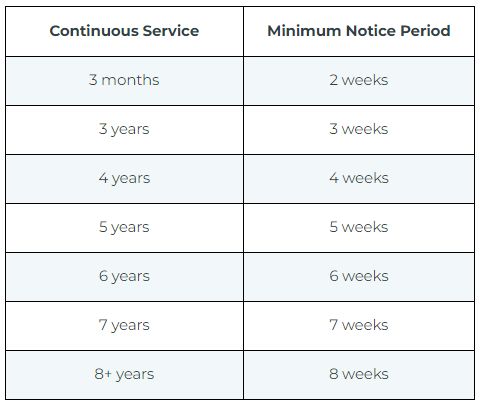The federal government recently announced that amendments that increase the minimum notice of termination required for an individual termination under the Canada Labour Code (the "Code") will take effect on February 1, 2024.1
The amendments will revise section 230 of the Code to provide employees who have completed at least three years of continuous service a longer notice period when they are terminated without cause – up to a maximum of eight weeks' notice or pay in lieu of notice.
The amendments will also require employers to provide terminated employees with a written statement of benefits. Federally regulated employers should proactively consider how the amendments will affect their obligations moving forward.
Changes to Minimum Notice of Termination
Under the individual termination provisions of the Code, employers must currently provide a minimum of two weeks' notice of termination, or pay in lieu of notice, to an employee who has completed at least three months of continuous employment with the employer.
The amendments will instead require employers to provide employees with a graduated notice of termination, or pay in lieu of notice, based on the length of an employee's continuous employment. For employees who have completed at least three months of continuous employment, the notice period will remain unchanged at two weeks. However, once an employee has completed three years of continuous employment, the notice period will increase to three weeks. Thereafter, the notice period will increase by one week for each additional year of service completed, up to a maximum of eight weeks' notice or pay in lieu of notice.

Eligible employees will still be entitled to severance pay under section 235 of the Code, in addition to their statutory notice or pay in lieu of notice. Severance pay remains the greater of two days' wages per completed year of service or five days wages.
New Requirement for a Written Statement of Benefits
The amendments will also establish a requirement for employers to provide a written statement of benefits to employees who are terminated. The statement of benefits must set out the employee's vacation benefits, wages, severance pay, and any other benefits and pay, such as a car or cell phone allowance, arising from their employment as of the date of the statement.
Where an employee receives pay in lieu of notice, the statement of benefits must be delivered to the employee no later than the date of their termination and, where an employee receives notice of termination, the statement of benefits must be delivered no later than two weeks before the date of their termination.
Takeaways for Federally Regulated Employers
Employers should proactively update their employment agreement templates before February 1, 2024, with language providing employees with at least the amended statutory minimum notice upon termination.
Existing agreements that provide less than the amended minimum entitlements by, for example, limiting notice to the previous minimum of two weeks', have a heightened risk of being found unenforceable by the court or adjudicator. In such cases, an employer may have to provide an employee with common law reasonable notice, which can be a far greater amount than the minimum notice provided for under the Code.
Footnote
1. Canada Gazette, Part 2, Volume 157, Number 13: Order Fixing February 1, 2024 as the Day on Which Certain Sections of the Budget Implementation Act, 2018, No. 2 Come into Force.
The foregoing provides only an overview and does not constitute legal advice. Readers are cautioned against making any decisions based on this material alone. Rather, specific legal advice should be obtained.
© McMillan LLP 2021
We operate a free-to-view policy, asking only that you register in order to read all of our content. Please login or register to view the rest of this article.



